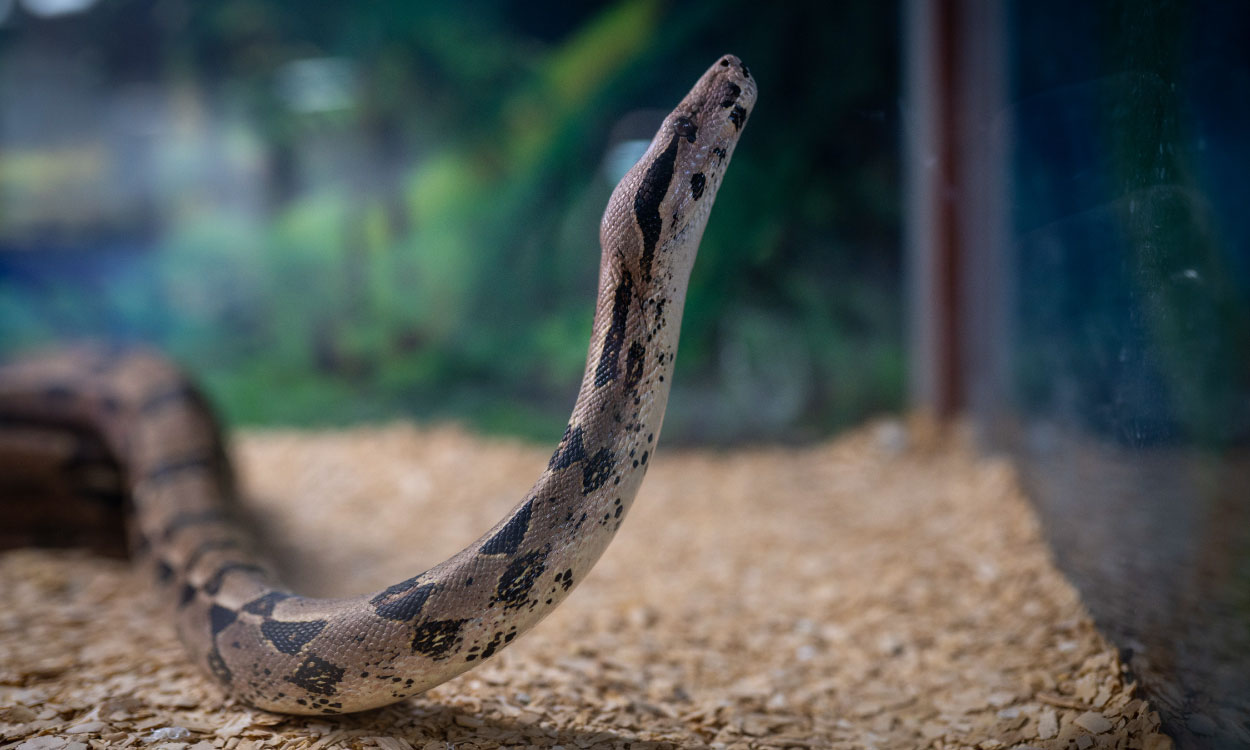If you own a snake, it can be worrying if your pet suddenly stops eating – especially if this behaviour is out of character. It’s normal to wonder how long they can safely go without a meal, and in this article, we’ll take a closer look at the question ‘how long can a snake go without food?’
Read on for more information…

How do snakes eat and digest food?
Unlike many creatures in the animal kingdom, snakes swallow their food whole in a truly unique way. Their jaws have stretchy ligaments that allow them to open their mouths incredibly wide (however, they do not detach their lower jaw as is often incorrectly claimed). This flexibility allows snakes to consume prey that is often much larger than themselves, including rodents, birds and even other reptiles.
Once the prey has been swallowed, the digestion process begins. A snake’s stomach produces powerful acid that breaks down the bones, fur and flesh of its prey. This process can take several days or even weeks, depending on the size of the meal and the conditions it is being eaten. Snakes are cold-blooded, and this means their metabolism is directly affected by their environment. When it’s warm, digestion happens faster, and when it’s cooler, it happens much slower.
This means that they can sometimes go long periods without eating, as they are using the energy from their previous meal.
How long can a snake go without food?
The amount of time a snake can go without eating varies significantly between species. Generally speaking, snakes can go many weeks and even months without food – and in special cases, even longer.
Young snakes tend to eat more often than older ones as they are growing. This means they should eat every few days or weeks. Adult snakes can sometimes go for months between meals, especially if they’ve been well-fed previously. Some species, like corn snakes, are well known for skipping meals for weeks at a time, especially during winter or breeding seasons.
The length of time a snake can go without eating depends on several factors, including:
- Species: Some snakes are more tolerant of long periods of not eating than others.
- Size of the last meal: A snake that has recently eaten a large meal can usually go longer without food.
- Metabolism: Warmer temperatures speed up metabolism, and colder temperatures slow it down.
It’s worth noting that pet snakes and those in captivity should not go many months without food unless they are shedding or breeding. If your pet snake has not eaten for several weeks, it’s a good idea to check with a vet.
Why do snakes stop eating?
There are a wide range of reasons why your snake might suddenly stop eating. This includes:
- Temperature issues: If the snake’s tank is too hot or cold, then it might make the snake lose its appetite. Snakes rely on external heat for the digestion process, so maintaining a suitable temperature is important.
- Stress or fear: Frequent handling, loud noises or new surroundings can make your snake anxious, and it may be less likely to eat.
- Shedding: When a snake is about to shed its skin, its appetite will often disappear. However, it should resume eating once this process is complete.
- Breeding or laying eggs: Female snakes often stop eating before laying eggs, and males may also go off their food during mating season.
- Illness: An unwell snake may refuse to eat. If your snake hasn’t eaten for several weeks, you should contact a vet.
How to encourage snakes to eat
If your snake is refusing to eat, there are several ways to help get its appetite back. This includes:
- Stop handling: Limit handling your snake until it has started eating again, as this may be causing it stress.
- Check the tank’s conditions: Make sure the enclosure’s temperature and humidity are suitable for the species of snake you own.
- Try a smaller enclosure: Some snakes do not like big spaces. Moving a snake to a smaller enclosure can sometimes make it feel safer and get its appetite back.
- Ensure it’s healthy: If nothing seems to work, the snake may be unwell. At this point, you should consult a vet.
How long can a snake go without water?
While snakes can survive long periods without food, water is different. They can’t go nearly as long without water, and most will not survive much longer than a week or two.
Even if the snake is not eating, it must always have a clean water source available.


